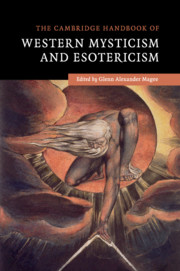Book contents
- Frontmatter
- Dedication
- Contents
- Acknowledgments
- Editor's Introduction
- List of contributors
- I ANTIQUITY
- II THE MIDDLE AGES
- III THE RENAISSANCE AND EARLY MODERNITY
- IV THE NINETEENTH CENTURY AND BEYOND
- 20 Spiritualism
- 21 H. P. Blavatsky and Theosophy
- 22 Rudolf Steiner and Anthroposophy
- 23 The Golden Dawn and the O.T.O.
- 24 G. I. Gurdjieff and the Fourth Way
- 25 C. G. Jung and Jungianism
- 26 René Guénon and Traditionalism
- 27 Via Negativa in the Twentieth Century
- 28 Contemporary Paganism
- 29 The New Age
- V COMMON THREADS
- Suggestions for Further Reading
- Index
- References
20 - Spiritualism
from IV - THE NINETEENTH CENTURY AND BEYOND
Published online by Cambridge University Press: 05 May 2016
- Frontmatter
- Dedication
- Contents
- Acknowledgments
- Editor's Introduction
- List of contributors
- I ANTIQUITY
- II THE MIDDLE AGES
- III THE RENAISSANCE AND EARLY MODERNITY
- IV THE NINETEENTH CENTURY AND BEYOND
- 20 Spiritualism
- 21 H. P. Blavatsky and Theosophy
- 22 Rudolf Steiner and Anthroposophy
- 23 The Golden Dawn and the O.T.O.
- 24 G. I. Gurdjieff and the Fourth Way
- 25 C. G. Jung and Jungianism
- 26 René Guénon and Traditionalism
- 27 Via Negativa in the Twentieth Century
- 28 Contemporary Paganism
- 29 The New Age
- V COMMON THREADS
- Suggestions for Further Reading
- Index
- References
Summary
Introduction
The religious movement known as Spiritualism was officially inaugurated in 1848 in Hydesville, New York, when two young sisters, Kate and Margaret Fox, attempted to communicate with an apparent poltergeist in their home. Using a laborious version of Morse code called “alphabet raps” (one for “a,” two for “b,” and so forth), the girls were able to interact with their ghost and question him about the circumstances of his death. Kate and Margaret's enterprising older sister, Leah Fish, began arranging public displays of this new talent and soon discovered that she too had a gift for talking to the dead. Spiritualism changed dramatically over the next fifty-plus years in terms of the modes of communication employed, and it developed a loose theology of earthly and heavenly progression. Nevertheless, the central point of its rituals and literature remained the same: that the living could communicate with those across the threshold of death.
The ability to talk to the residents of heaven functioned effectively as an amateur form of grief counseling: the American Civil War and high infant mortality rates sent the bereaved to séances in droves to learn the fates of their loved ones. Almost without exception, these were happy scenarios with the departed thriving in the afterlife amid relatives and in the company of angels. Children grew up in heaven, completing the life cycles that had been severed on earth. They went to school, grew physically in their spirit bodies, and occasionally even got married in the afterlife. Heaven was a bustling and busy place that was generally portrayed as made up of seven consecutive tiers. Instead of being instantly perfected upon death, the residents of heaven all grew in knowledge and spiritual refinement, advancing through the tiers of heaven and relating the practices and ethics of the afterlife to their living friends and family.
Access to the dead not only gave the grieving assurances about the well-being of their loved ones, it also provided the opportunity to consult the finest minds of history on current topics. William Shakespeare, Benjamin Franklin, Francis Bacon, and Emanuel Swedenborg were among those frequently called on to give advice from beyond the grave. Domestic concerns were usually tended to in the more personal space of a séance in one's home, whereas larger public affairs took place along the lines of the tent revivals that had swept America earlier in the century.
- Type
- Chapter
- Information
- The Cambridge Handbook of Western Mysticism and Esotericism , pp. 237 - 247Publisher: Cambridge University PressPrint publication year: 2016
References
- 1
- Cited by



